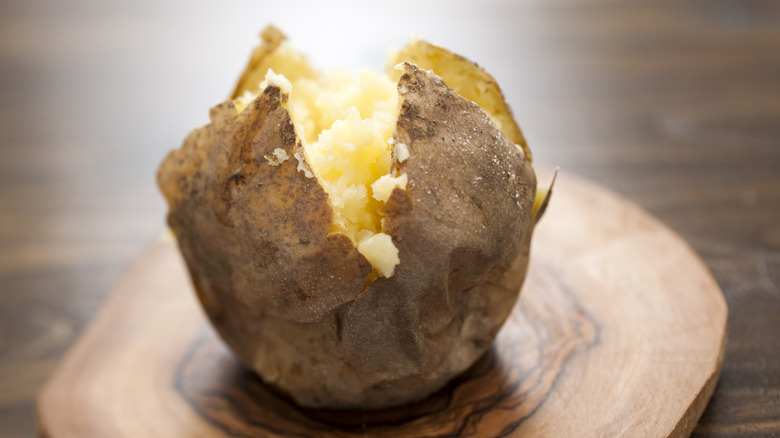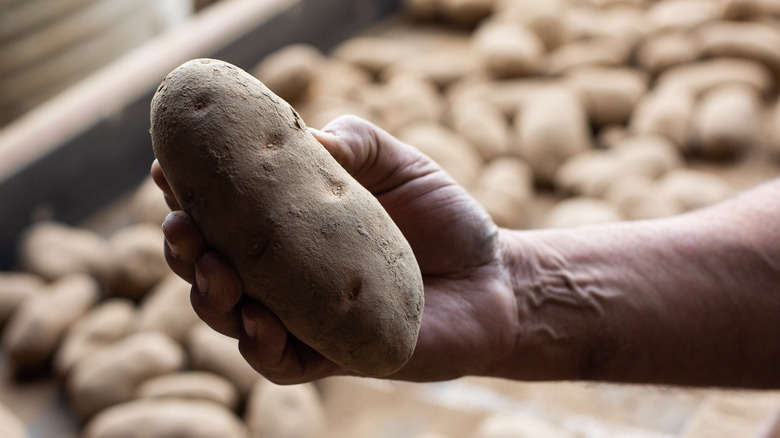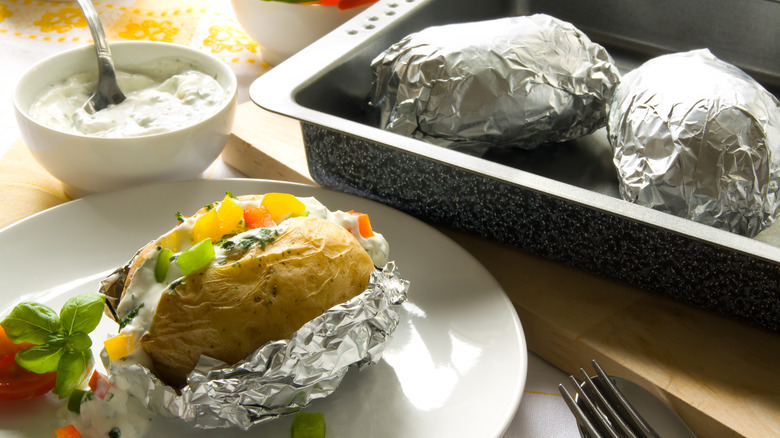For Extra Fluffy Baked Potatoes, Freeze Them First
As far as potatoes go, we can all agree there are generally only two textures that are considered acceptable: fluffy and crispy. Whether it be french fries, chips, or mashed potatoes, the texture is just as important as the flavor. No one wants to bite into a chewy potato chip or eat a spoonful of gluey mashed potatoes. Following the proper cooking technique is usually the key to achieving optimal results, but when it comes to baked potatoes it's a little different.
While the oven temperature and baking time are important, they aren't the only factors that influence the fluffiness of a baked potato. When potatoes cook, Food Crumbles explains, the starches absorb water until they rupture. Steam gets produced in the process, and that's how a potato gets fluffy. When baking whole potatoes, however, the steam is trapped inside. To release it, you'll simply need to prick the skin with a fork or knife before you stick your potatoes in the oven, MyRecipes shares. This is the most common way to achieve fluffy baked potatoes, but there's actually something else you can do to rupture the starches even more.
What happens when you freeze potatoes before baking them?
There are plenty of foods that you can stash in the freezer without ruining them, but potatoes aren't generally thought of as one of them. That's because, as Foods Guy says, potatoes store water inside their cells, and when you try to defrost them, they become mushy on the inside. If you put them straight in the oven on the other hand, they'll come out perfectly fluffy.
This may seem too good to be true, but according to chef and restaurateur Lucas Sin (via Instagram), it works because of how freezing affects potato starch. When the water inside the starch crystallizes or turns into ice, it expands, similar to what happens when potatoes cook. Since the potato starch gets ruptured twice — first when you freeze it, then when you bake it — your potatoes will have double the fluffiness. For best results, Sin recommends leaving the potatoes in the freezer for at least an hour before baking at 450 degrees for 40 minutes to an hour.
A fluffy texture starts with the right potato
If you're making potato salad, hash browns, or any potato recipe where you want the potato to hold its shape, the waxy varieties are best. But if you're making baked potatoes, where a fluffy texture is more desirable, starchy ones like Idaho or russet are ideal. Per Southern Living, starchy potatoes are higher in starch but lower in moisture, so they have a naturally fluffier consistency.
Because waxy potatoes are higher in moisture, you might assume that freezing would have more of an effect on them, but that's not the case at all. Crystallization occurs when the water in the starch freezes, as Lucas Sin pointed out (via Instagram), but while waxy potatoes are made up of more water, it isn't contained within the starches, which means waxy potatoes remain largely unaffected by freezing, Grow a Good Life notes. Therefore if you're making baked potatoes — whether you freeze them beforehand or not — it's always best to stick to a starchy potato.


